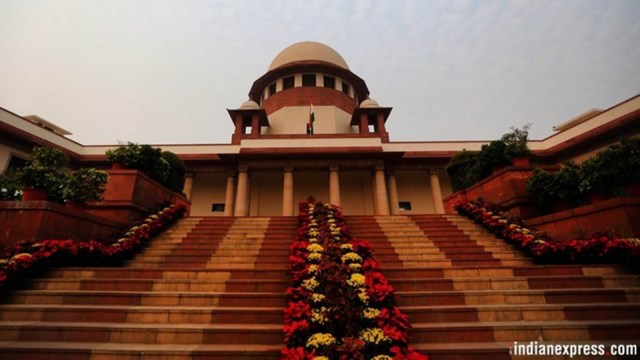Granting bail to a man charged under the stringent Unlawful Activities Prevention Act (UAPA) for renting out a portion of his house to alleged cadre of the banned Popular Front of India (PFI) who were planning to carry out disturbances during Prime Minister Narendra Modi’s visit to Bihar in 2022, the Supreme Court Tuesday said the principle “bail is the rule and jail is an exception” will apply even to statutes with stringent bail conditions.
The bench of Justices A S Oka and Augustine George Masih said, “When a case is made out for a grant of bail, the Courts should not have any hesitation in granting bail. The allegations of the prosecution may be very serious. But, the duty of the Courts is to consider the case for grant of bail in accordance with the law. ‘Bail is the rule and jail is an exception’ is a settled law. Even in a case like the present case, where there are stringent conditions for the grant of bail in the relevant statutes, the same rule holds good with only modification that the bail can be granted if the conditions in the statute are satisfied.”


“The rule also means that once a case is made out for the grant of bail, the Court cannot decline to grant bail. If the Courts start denying bail in deserving cases, it will be a violation of the rights guaranteed under Article 21 of our Constitution,” it said.
Story continues below this ad
The bench said this while granting bail to accused Jalaluddin Khan, a retired police constable, who was arrested under UAPA for renting the first floor of the Ahmad Palace building in Patna’s Phulwari Sharif, which was in the name of his wife, to alleged PFI cadre.
Opposing his bail plea, the National Investigation Agency (NIA) had said that Khan, listed as accused number 2, was seen on CCTV grabs removing certain items from the first floor on July 6 and 7, 2022, along with accused number 1, who had been an active member of banned Student Islamic Movement of India (SIMI). When police conducted a raid on July 11, 2022, following specific intelligence, those items were not found, indicating that Khan had tampered with the evidence.
Writing for the bench, Justice Oka said there is no mention in the charge sheet about the nature of the articles allegedly shifted by Khan from the first floor premises. The bench also agreed with his counsel that “if” he “intended to allow the conduct of the objectionable activities of PFI by giving first floor premises on rent, he would not have installed CCTV cameras”.
It also raised doubts on the statement of a protected witness and said “there is nothing in the charge sheet which shows that the appellant has taken part in or has committed unlawful activities as defined in the UAPA. There is no specific material to show that the appellant advocated, abetted, or incited commission of any unlawful activities. A terrorist act is defined in Section 15(1).
Story continues below this ad
Assuming that the co-accused were indulging in terrorist acts or were making any act preparatory to the commission of terrorist acts, there is absolutely no material on record to show that there was any conspiracy to commit any terrorist act to which the appellant was a party. There is no material produced on record to show that the appellant advocated, abetted, advised, or incited the commission of terrorist acts or any preparatory activity”.
Noting that it was Khan’s son who conducted the negotiations for giving the first floor on rent, it said “taking the charge sheet as correct, it is not possible to record a prima facie finding that the appellant knowingly facilitated the commission or preparation of terrorist acts by letting out the first floor premises. Again, there is no allegation in the charge sheet against the appellant that he organised any camps to impart training in terrorism”.
It said “there is not even an allegation in the charge sheet that the appellant was a member of any terrorist gang… The charge sheet does not mention the name of the terrorist organisation within the meaning of Section 2 (m) of which the appellant was a member”.
It said even “assuming that the appellant knew that co-accused Athar Parvez was associated with PFI, it is not listed as a terrorist organisation within the meaning of Section 2 (m) of UAPA. Moreover, the charge sheet does not contain any material to show any connection of the appellant with PFI before letting out first floor premises to accused no.1”.
Story continues below this ad
“Therefore, on plain reading of the charge sheet, it is not possible to record a conclusion that there are reasonable grounds for believing that the accusation against the appellant of commission of offences punishable under the UAPA is prima facie true,”,it said.
The bench said that the “Special Court and the High Court did not consider the material in the charge sheet objectively. Perhaps the focus was more on the activities of PFI, and therefore, the appellant’s case could not be properly appreciated”.
It also clarified that “the tentative findings recorded in this judgment are only for considering the prayer for bail. The reasons are confined to the case of the appellant. The same will have no bearing on the trial and cases of the co-accused”.










